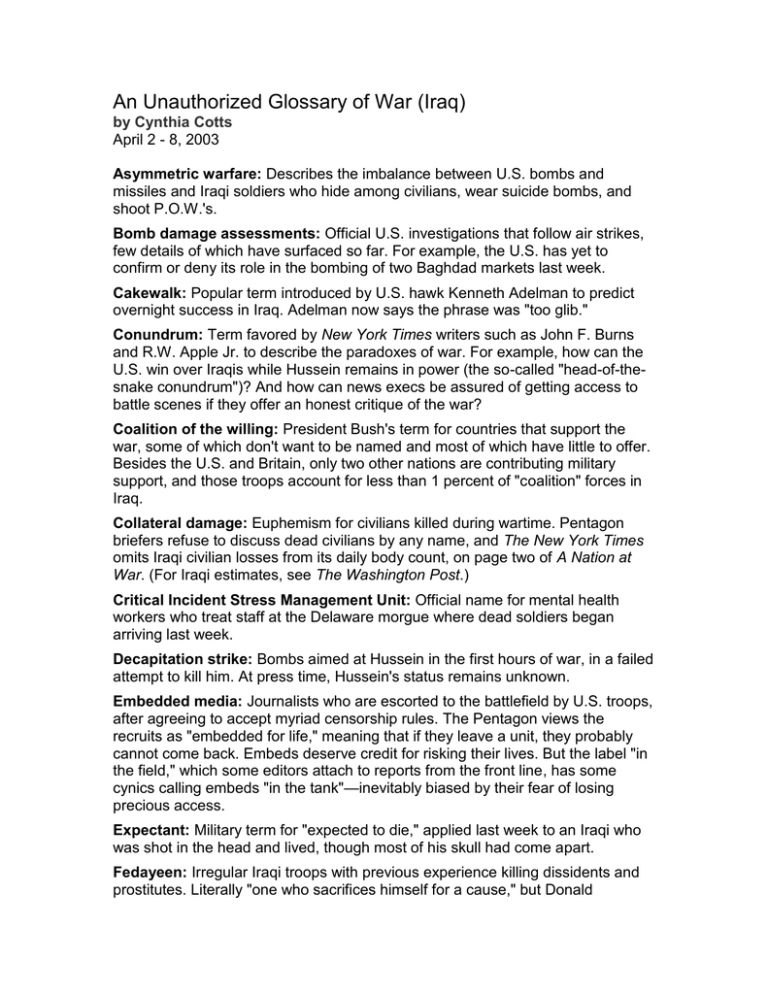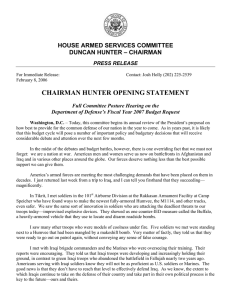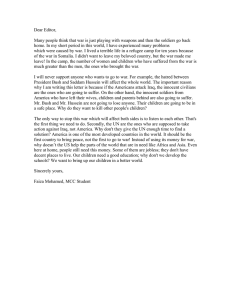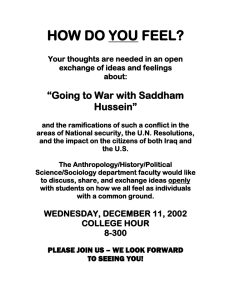An Unauthorized Gossary of War (Iraq) (MSWord)
advertisement

An Unauthorized Glossary of War (Iraq) by Cynthia Cotts April 2 - 8, 2003 Asymmetric warfare: Describes the imbalance between U.S. bombs and missiles and Iraqi soldiers who hide among civilians, wear suicide bombs, and shoot P.O.W.'s. Bomb damage assessments: Official U.S. investigations that follow air strikes, few details of which have surfaced so far. For example, the U.S. has yet to confirm or deny its role in the bombing of two Baghdad markets last week. Cakewalk: Popular term introduced by U.S. hawk Kenneth Adelman to predict overnight success in Iraq. Adelman now says the phrase was "too glib." Conundrum: Term favored by New York Times writers such as John F. Burns and R.W. Apple Jr. to describe the paradoxes of war. For example, how can the U.S. win over Iraqis while Hussein remains in power (the so-called "head-of-thesnake conundrum")? And how can news execs be assured of getting access to battle scenes if they offer an honest critique of the war? Coalition of the willing: President Bush's term for countries that support the war, some of which don't want to be named and most of which have little to offer. Besides the U.S. and Britain, only two other nations are contributing military support, and those troops account for less than 1 percent of "coalition" forces in Iraq. Collateral damage: Euphemism for civilians killed during wartime. Pentagon briefers refuse to discuss dead civilians by any name, and The New York Times omits Iraqi civilian losses from its daily body count, on page two of A Nation at War. (For Iraqi estimates, see The Washington Post.) Critical Incident Stress Management Unit: Official name for mental health workers who treat staff at the Delaware morgue where dead soldiers began arriving last week. Decapitation strike: Bombs aimed at Hussein in the first hours of war, in a failed attempt to kill him. At press time, Hussein's status remains unknown. Embedded media: Journalists who are escorted to the battlefield by U.S. troops, after agreeing to accept myriad censorship rules. The Pentagon views the recruits as "embedded for life," meaning that if they leave a unit, they probably cannot come back. Embeds deserve credit for risking their lives. But the label "in the field," which some editors attach to reports from the front line, has some cynics calling embeds "in the tank"—inevitably biased by their fear of losing precious access. Expectant: Military term for "expected to die," applied last week to an Iraqi who was shot in the head and lived, though most of his skull had come apart. Fedayeen: Irregular Iraqi troops with previous experience killing dissidents and prostitutes. Literally "one who sacrifices himself for a cause," but Donald Rumsfeld calls the name "a lie" and has banned his troops from using it. The Pentagon prefers "death squads" or "thugs." Forward Operating Base Shell: Headquarters of the 101st Airborne Division in central Iraq. Soldiers nicknamed this and another army outpost "Camp Shell" and "Camp Exxon," supposedly because the fuel stations remind them of filling stations at home. Forward Resuscitative Surgical Suites, a/k/a Devil Docs: Navy doctors who treat all wounded on the battlefield, including Iraqi soldiers and civilians. The docs say they give priority to people with the worst injuries, regardless of which side they're on. Friendly fire: When coalition troops accidentally fire on friends. U.S. fire has killed three British soldiers so far, causing General Richard Myers to apologize and promise it won't happen again. Human exploitation team: Marines who oversee "low-priority detainees" in Iraq. Indemnity: A legal guarantee that the U.S. government seeks from all embedded reporters and contractors in Iraq, stating that the government is blameless and cannot be sued for property damage or personal injury or loss of life. Information Operations: The new name for the Pentagon's propaganda unit. The old terms "psychological warfare" and "psy-ops" have been retired by America's top information official because he considers them "too mind-bending." Incestuous amplification: A wartime condition that occurs when policy makers listen only to people who share their set beliefs, increasing the risk for miscalculation. See "cakewalk." Kill box: A zone in which pilots are free to search for and attack targets at will. Military-age male: Marine term for Iraqi males between boyhood and old age— all of whom are considered suspects and thus eligible for detention. Negative health consequences: Term used to describe illnesses linked to the smallpox vaccine, which now include three fatal heart attacks. Operational pause: Describes troops that have stopped advancing. Last week, reporters described the troops as getting "bogged down," which led a top British military official to complain, "This 'bogged down' is a tendentious phrase." Operation Iraqi Freedom: Official name for the war on Iraq. Bush says his goal is to free Iraqis, not to occupy their country and seize their oil resources. Pockets: Term used to shrink bad news. For example, swarming Fedayeen are termed "pockets of resistance." Hordes of hungry people are "pockets of need." Reactive Skin Decontamination Lotion, a/k/a RSDL: A Canadian product approved by the FDA, for troops to apply after a chemical attack. Reconstruction: New term for nation building. The U.S. plans to award $1.9 billion in reconstruction contracts, which will go exclusively to U.S. companies. Red line, a/k/a red zone: A ring around Baghdad at which U.S. troops expect to encounter the Republican Guard and their first exposure to alleged chemical weapons. Son of a dog: Term used by some Iraqis to describe Saddam Hussein. Thieves of Iraq: Term used by some Arabs to describe Bush, Tony Blair, and Condoleezza Rice, in a spoof on the Egyptian movie Thieves of Thailand. War crimes: Acts banned by international law. Both sides are accused of committing these, ranging from executing P.O.W.'s and posing as civilians to bombing the headquarters of Iraqi state-run radio and TV. Weapons of mass destruction, a/k/a WMD: Bush says the war is justified because Hussein won't get rid of these, but after extensive searches in Iraq, U.S. troops have yet to find any evidence of WMD whatsoever.







